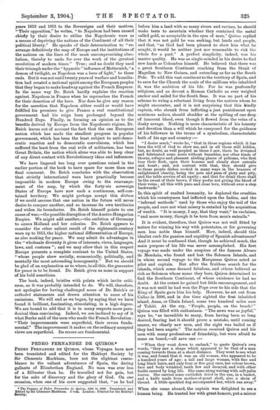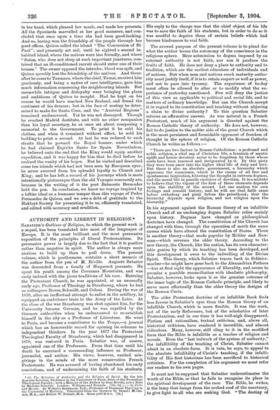PEDRO FERNANDEZ DE QUIROS.*
PEDRO FERNANDEZ DE QUIROS, whose Voyages have now been translated and edited for the Hakluyt Society by Sir Clements Markham, bore not the slightest resem- blance to the valiant adventurers of Spain, the daring gallants of Elizabethan England. No man was ever less of a filibuster than he. He travelled not for gain, but for the sake of discovery and the glory of God. On one occasion, when one of his crew suggested that, "as he had • The Voyages of Pedro Fernandez de Quires, 1696 to 1606. Translated and Edited by Sir Clemente Markham. 2 vela. London: Printed for the Ilakluyt Society.
before him a land with so many rivers and ravines, he should make tests to ascertain whether they contained the metal called gold, so acceptable in the eyes of man," Quiros replied that it was not gold he was seeking, but lands and people, and that, "as God had been pleased to sbew him what he sought, it would be neither just nor reasonable to risk the whole for a part." A perfect simplicity, indeed, was his master quality. He was as single-minded in his desire to find new lands as Columbus himself. He believed that there was a great Southern Continent reaching from the Strait of Magellan to New Guinea, and extending as far as the South Pole. To add this vast continent to the territory of Spain, and to save for the Church the souls of the millions who inhabited it, was the ambition of his life. For he was profoundly religious, and as devout a Roman Catholic as ever weighed anchor and sailed for the South Seas. It was no part of his scheme to wring a reluctant living from the natives whom be might encounter, and it is not surprising that this kindly captain, who shrank from inflicting a just punishment upon mutinous sailors, should shudder at the spilling of one drop of innocent blood, even though it flowed from the veins of a. dusky savage. Nothing is more characteristic of his honesty and devotion than a will which he composed for the guidance of his followers in the terms of a, symbolism, characteristic both of his age and country :—
" I desire much," wrote he, "that in these regions which it has been the will of God to show me, and in all those still hidden, but, no doubt, as well peopled as those I saw, there be d.siened and fabricated some nests without brambles, nor other kinds of thorns, refuges and pleasant abiding places of pelicans, who first tear their flesh, open their bosoms and clearly show entrails and heart ; and, not content with that, they should give to these people dishes cooked in many ways in the braziers of enlightened charity, being the pots and pans of piety and pity, and the table service of all equity ; and that for drink there shall be the sweat of their brows, if they prefer not giving the blood of their veins ; all this with pure and clear love, without ever a step backwards."
In this spirit of exalted humanity, he deplored the cruelties which his countrymen had inflicted upon the Indies, and the "infernal methods" used by those who enjoy the toil of the people, and care not what misery is entailed by the acquisition of wealth. "It is money, I say, that they want," he exclaims, "and more money, though it be torn from men's entrails."
It is evident, therefore, that Quiros was not well fitted by nature for winning his way with potentates, or for governing men less noble than himself. How, indeed, should this idealist curb the passion and cupidity of Spanish adventurers? And it must be confessed that, though he achieved much, the main purpose of his life was never accomplished. His first voyage was made under the auspices of the famous Alvaro de Mendalia, who found and lost the Solomon Islands, and in whose second voyage to the Marquesas Quiros acted as pilot and captain. But after the fruitless search for the islands, which some deemed fabulous, and others believed as rich as Solomon whose name they bore, Quiros determined to find the Southern Continent, of whose existence he had no doubt. At the outset he gained but little encouragement, and it was not until he had won the Pope over to his side that the King of Spain gave him his help. However, he set out from Callao in 1606, and in due time sighted the first inhabited island, Anaa, or Chain Island, some two hundred miles east
of Tahiti. At the cry, "People, people, on the beach ! " Quiros was filled with enthusiasm. "The news was as joyful,"
says he, "as incredible to many, from having been so long desired, fearing lest it should prove a mistake, until coming nearer, we clearly saw men, and the sight was hailed as if they had been angels." The natives received Quiros and his men with many professions of friendship, but were afraid to come on board,—all save one :—
"When they went down to embark," to quote Quires's own words, "they saw a shape which appeared to be that of a man coming towards them at a short distance. They went to see what it was, and found that it was an old woman, who appeared to be a hundred years of age: a tall and large woman, with fine and long black hairs, and only four or five grey ones, her colour brown, face and body wrinkled, teeth few and decayed, and with other faults caused by long life. She came along waving with soft palm leaves. She carried some cuttlefish dried in the sun, in a basket, and a knife made from mother-of-pearl shell, also a skein of thread. A little speckled dog accompanied her, which ran away."
When she came aboard, the captain was delighted to see a human being. He treated her with great honour, put a mirror in her hand, which pleased her much, and made her presents. All the Spaniards marvelled at her good manners, and con- cluded that once upon a time she had been good-looking. And so, having won the friendship of the people through her good offices, Quiros called the island "The Conversion of St. Paul"; and presently set sail, until he sighted a second in- habited island, where the natives were less friendly, and where "Satan, who does not sleep at such important junctures, con- trived that an ill-conditioned recruit should enter one of their houses." The owner opposed the intruder, blood was spilt, and Quiros speedily lost the friendship of the natives. And there- after he came to Taumaco, where the chief, Tumai, received him graciously, and being a native of rare intelligence, gave him much information concerning the neighbouring islands. But meanwhile intrigue and disloyalty were bringing the plans and ambitions of Quiros to naught. Had he kept on his course he would have reached New Zealand, and found the continent of his dreams; but in the face of mutiny he deter- mined to make for Santa Cruz, and the "Austria! Regions" remained undiscovered. Yet he was not dismayed. Though he reached Madrid destitute, and with no other companion than his loyal secretary, he at once set about composing a memorial to the Government. To print it he sold his clothes, and when it remained without effect, he sold his bedding to print a second. At last be was reduced to such straits that he pawned the Royal banner, under which he had claimed Espiritu Santo for Spain. Nevertheless, he believed unto the end that the King would equip another expedition, and it was happy for him that he died before he realised the vanity of his hopes. But he visited and described some ten islands which had not been seen by European eyes ; be never swerved from his splendid loyalty to Church and King ; and he has left a record of his journeys which is more intentionally picturesque than the old Voyages commonly are, because in the writing of it the poet Belmont:: Bermudez held the pen. In conclusion, we know no voyage inspired by a loftier ideal or a humaner temper than this voyage of Pedro Fernandez de Quiros, and we owe a debt of gratitude to the Hakluyt Society for presenting it to us, efficiently translated, and edited with accuracy and erudition.







































 Previous page
Previous page